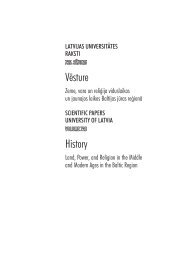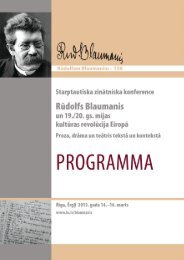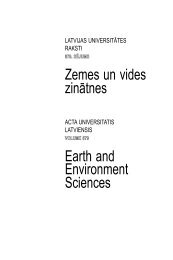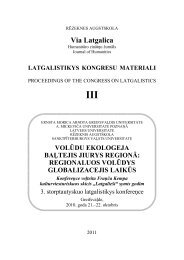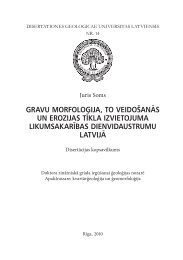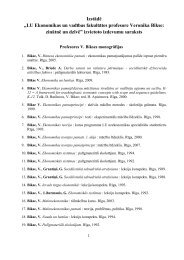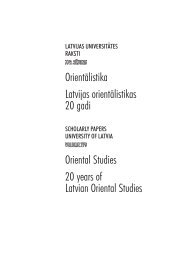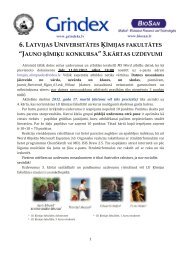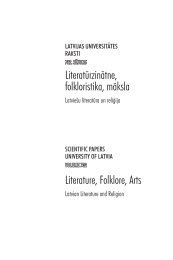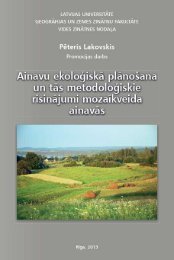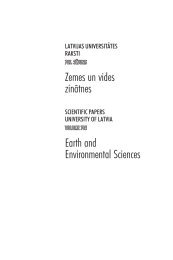Untitled
Untitled
Untitled
You also want an ePaper? Increase the reach of your titles
YUMPU automatically turns print PDFs into web optimized ePapers that Google loves.
28 LITERATÛRZINÂTNE, FOLKLORISTIKA, MÂKSLA<br />
talitarian while pretending to be something else entirely, Havel terms it<br />
post–totalitarian:<br />
The post–totalitarian system touches people at every step, but does so<br />
with its ideological gloves on. This is why life in the system is so thoroughly<br />
permeated with hypocrisy and lies: government by bureaucracy<br />
is called popular government; the working class is enslaved in the name<br />
of the working class; the complete degradation of the individual is pretended<br />
as his ultimate liberation; depriving people of information is<br />
called making it available; the use of power to manipulate is called the<br />
public control of power, and the arbitrary abuse of power is called observing<br />
the legal code; the repression of culture is called its development;<br />
the expansion of imperial influence is presented as support for the oppressed;<br />
the lack of free expression becomes the highest form of freedom;<br />
farcical elections become the highest form of democracy; banning<br />
independent thought becomes the most scientific of world views; military<br />
occupation becomes fraternal assistance. Because the regime is captive<br />
to its own lies, it must falsify everything. It falsifies its past. It falsifies<br />
the present, and it falsifies the future. It falsifies statistics. It pretends<br />
not to possess an omnipotent and unprincipled police apparatus. It pretends<br />
to respect human rights. It pretends to persecute no one. It pretends<br />
to fear nothing. It pretends to pretend nothing. 4<br />
The main difference in the psychology of the newcomers and the basic indigenous<br />
population of Latvia was the fact that the former believed into this ideology and the<br />
latter did not. The question that emerges is this: if they believed in this ideology, was<br />
it because it was convenient to believe in it, or was it the result of naiveté and lack of<br />
education? This is a very delicate question. One can answer it frankly only deep down<br />
in one’s own heart. If the belief in this ideology was genuine, it grew out of insufficient<br />
knowledge, or lack of education. It proves that Russia was colonising neighboring<br />
territories that had generally reached a higher level of development than Russia<br />
itself. If, on the other hand, the answer is that it was a matter of convenience to believe<br />
in this ideology, then the talk about theory of “liberation” and “rendering fraternal<br />
help” collapses automatically. This brings about the feeling of uneasiness that<br />
occasionally springs up between two groups: one of whom has been telling lies, and<br />
the other one who was forced to pretend to believe them.<br />
This is why the postcolonial syndrome in Latvia has its own specific features:<br />
1. After Latvia regained its independence the new–comers did not leave the country,<br />
like in “classical” colonial states such as India, Algeria etc. Instead they remained,<br />
trying to live on keeping appearances, pretending that nothing has happened,<br />
that they are still living in the same country as before (i.e. USSR). This<br />
feeling is supported by the informative space they live in. And that is why they<br />
often keep presenting the loss of their privileges as the oppression of minorities,<br />
or a violation of human rights.<br />
2. The native population in its turn is also caught up in deception. They treat the<br />
new–comers as if they do not exist at all and ignore them, regarding their prob-



